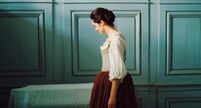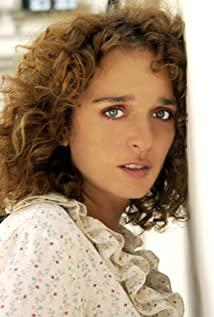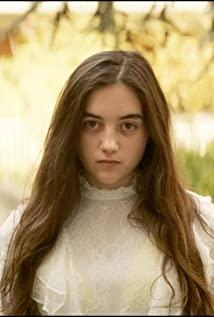Looking back at the tearful kiss between Eloise and Marianne on the beach repeatedly, I found a few small details:
1. The moment Marian hugged Eloise from behind, Eloise took a light breath on her lower lip. In the past, Marian saw through her that "biting her lip" meant "embarrassment". The emotion contained in the action here should be It was more of an "unexpected surprise". After all, the two had just "argued" upstairs. Eloise went to the beach, expecting Marianne to find her, and most importantly, she know she will come. But he was still overwhelmed by the enthusiasm of his lover.
2. Eloise was obviously angry, and she couldn't help but shed tears when she heard Marianne crying "forgive me" over and over again. But she knew very well that reconciliation with the artist's inner pleas would mean a permanent separation in the near future. She did not dare to look back, for fear of encountering the painter's more fiery touch and falling deeper and deeper. Lip biting is more frequent here.
3. But her "preservation" and stiffness are uncontrollably disintegrating, perhaps corresponding to her own defense when discussing the myth, "because he loves her so much, he can't help it", her hand slowly He rubbed the artist's embraced hand upwards, making the final decision with difficulty. She is going back.
4. "Your mother returns tomorrow" After hearing Marianne's whisper, she hesitated for less than 3 seconds and quickly turned her head back to face Marianne's tearful eyes. This is the last chance. It is difficult to read every second. She can't help turning around, although this time her lover does not call: "Go back." As Hades stipulated, reality also has rules, and to a certain extent human The terms are worse and crueler, and they are endless. If Eloise doesn't look back, they won't have time.
5. From the picture, it can be seen vaguely (should be) that the skin under Eloise's right eye socket is slightly red, and she is already crying, or she is crying.
6. Eloise Cried
7. Marianne kissed her, and for 2 seconds she used all her strength to respond, kissing Marianne staggeringly, taking a step back as if she was about to fall. Then she held back her actions and handed over the initiative to Marianne again, while she stretched out her left hand to wipe the tears from her lover's right cheek.
8. Mary soothed her hair, cupped her cheeks with both hands, and wiped her tears. At this time, Eloise looked and moved like a child (remembering the childhood kiss when she said goodbye to her mother), bowing her head and saying nothing , caressing the skin and neckline of Marianne's chest with her left hand, crying silently. She is expressing intimacy in the way of Eloise, pinning her devout and forbearing love for Marianne. The above are some personal opinions, not a serious interpretation, but more of a curiosity and conjecture between them. This tearful kiss at the seaside is my favorite scene besides the bonfire looking at each other. It feels like it's also the emotional high point of the whole film, followed by a cool turning point. In 1760, on the coast of the lonely island, two women wept and kissed each other, bright green and ochre red, and the sound of hunting wind. This scene should be remembered in film history. This is a movie that is too worth watching and brushing, and it should be seen by more people.
View more about Portrait of a Lady on Fire reviews











